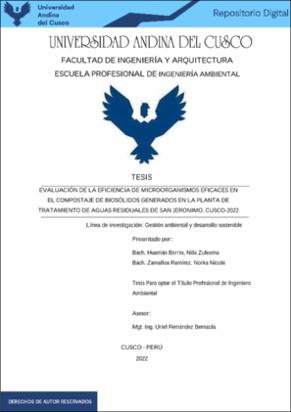| dc.contributor.advisor | Fernández Bernaola, Uriel Raúl | |
| dc.contributor.author | Huamán Berrio, Nila Zulexma | |
| dc.contributor.author | Zamalloa Ramírez, Norka Nicole | |
| dc.date.accessioned | 2023-01-03T21:17:05Z | |
| dc.date.available | 2023-01-03T21:17:05Z | |
| dc.date.issued | 2022-11-04 | |
| dc.identifier.uri | https://hdl.handle.net/20.500.12557/5130 | |
| dc.description.abstract | La investigación titulada “EVALUACIÓN DE LA EFICIENCIA DE
MICROORGANISMOS EFICACES EN EL COMPOSTAJE DE BIOSÓLIDOS
GENERADOS EN LA PLANTA DE TRATAMIENTO DE AGUAS RESIDUALES DE SAN
JERONIMO, CUSCO-2022”, tuvo como objetivo principal Evaluar la eficiencia de los
microorganismos eficaces en el compostaje de biosólidos generados en la planta de tratamiento
de aguas residuales de San Jerónimo, Cusco-2022, por otro lado como objetivos específicos
de esta investigación fueron : caracterizar los parámetros de estabilización, toxicidad química
e higienización de biosólidos, evaluar los parámetros físico-químicos y determinar la dosis
optima de microorganismos eficaces en el compostaje. El diseño fue de tipo experimental, se
tuvo doce unidades experimentales, cuatro tratamientos con tres repeticiones (T0: Sin EM-
compost, T1:50 ml EM-Compost, T2:75 ml EM-Compost y T3:100 ml EM-Compost).Además
el proceso experimental estuvo comprendido por tres principales fases: Acondicionamiento de
biosólidos, análisis en laboratorio y compostaje de biosólidos para cumplir con cada uno de los
objetivos se realizó tres análisis de laboratorio en diferentes tiempos (caracterización,
biosólidos acondicionado y compost de biosólidos) cabe recalcar que cada uno estuvo dado al
inicio, a la mitad y al final respectivamente. El acondicionamiento de biosólidos tuvo una
duración de 2 semanas y el compostaje 7 semanas. Se llego a la principal conclusión que el
tratamiento (T3:100ml EM-Compost ) obtuvo mejores respuestas en los principales parámetros
de control de calidad de compost como son nitrógeno disponible: 0.01% , fosforo disponible:
3.13 mg/100 gr , potasio disponible: 1.37 mg/100 gr , escherichia coli: 40000 NMP/25gr,
salmonella spp. 120000 NMP/25gr , cromo: 2.00 mg/kg y cadmio: 0.15 mg/kg. | es_PE |
| dc.description.abstract | The present investigation entitled " EVALUATION OF THE EFFICIENCY OF
EFFECTIVE MICROORGANISMS IN THE COMPOST OF BIOSOLIDS GENERATED IN
THE WASTEWATER TREATMENT PLANT OF SAN JERONIMO, CUSCO-2022", had as
main objective Evaluate the efficiency of effective microorganisms in the composting of
biosolids generated in the wastewater treatment plant of San Jerónimo, Cusco-2022, on the
other hand, the specific objectives of this research were: to characterize the stabilization
parameters, chemical toxicity and sanitization of biosolids, to evaluate the physical-chemical
parameters and to determine the optimal dose of effective microorganisms in composting. The
design was of an experimental type, there were twelve experimental units, four treatments with
three repetitions (T0: Without EM-compost, T1: 50 ml EM-Compost, T2: 75 ml EM-Compost
and T3: 100 ml EM-Compost) In addition, the experimental process was comprised of three
main phases: biosolids conditioning, laboratory analysis, and biosolids composting. To meet
each of the objectives, three laboratory analyzes were carried out at different times
(characterization, biosolids conditioning, and biosolids compost). It should be noted that each
one was given at the beginning, in the middle and at the end respectively. Biosolids
conditioning lasted 2 weeks and composting 7 weeks. The main conclusion was reached that
the treatment (T3: 100ml EM-Compost) obtained better responses in the main compost quality
control parameters such as available nitrogen: 0.01%, available phosphorus: 3.13 mg/100 gr,
available potassium: 1.37 mg/100 gr, Escherichia coli: 40,000 MPN/25g, salmonella spp.
120000 NMP/25gr, chromium: 2.00 mg/kg and cadmium: 0.15 mg/kg. | en_US |
| dc.format | application/pdf | es_PE |
| dc.language.iso | spa | es_PE |
| dc.publisher | Universidad Andina del Cusco | es_PE |
| dc.rights | info:eu-repo/semantics/restrictedAccess | es_PE |
| dc.rights.uri | https://creativecommons.org/licenses/by-nc-nd/4.0/ | es_PE |
| dc.subject | Microorganismos eficaces | es_PE |
| dc.subject | Biosólidos | es_PE |
| dc.subject | Compostaje | es_PE |
| dc.subject | Tratamiento de aguas residuales | es_PE |
| dc.title | Evaluación de la eficiencia de microorganismos eficaces en el compostaje de biosólidos generados en la planta de tratamiento de aguas residuales de San Jeronimo, Cusco-2022 | es_PE |
| dc.type | info:eu-repo/semantics/bachelorThesis | es_PE |
| thesis.degree.name | Ingeniero Ambiental | es_PE |
| thesis.degree.grantor | Universidad Andina del Cusco. Facultad de Ingeniería y Arquitectura | es_PE |
| thesis.degree.discipline | Ingeniería Ambiental | es_PE |
| dc.publisher.country | PE | es_PE |
| dc.subject.ocde | https://purl.org/pe-repo/ocde/ford#2.07.01 | es_PE |
| renati.advisor.dni | 43130855 | |
| renati.advisor.orcid | https://orcid.org/0000-0002-9386-702X | es_PE |
| renati.author.dni | 73750916 | |
| renati.discipline | 521066 | es_PE |
| renati.juror | Calderón La Torre, Felio | |
| renati.juror | Huarhua Chipani, Teodoro | |
| renati.juror | Zamalloa Acurio, Violeta Eugenia | |
| renati.juror | Lopez Pacheco, Gorky | |
| renati.level | https://purl.org/pe-repo/renati/level#tituloProfesional | es_PE |
| renati.type | https://purl.org/pe-repo/renati/type#tesis | es_PE |



